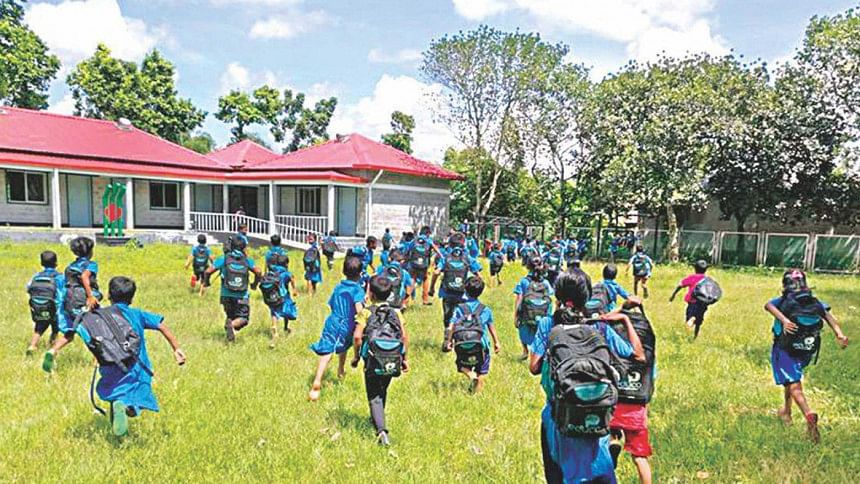Community partnership can minimise learning gaps

While schools are primarily responsible for facilitating schooling activities for the students, there are other factors as well that play crucial roles in ensuring the best learning experiences. Community partnership is one of them.
The significance of community partnership in the context of primary education in Bangladesh is enormous, particularly when children are set to go back to school after an 18-month hiatus from regular academic activities because of the Covid-19 pandemic.
The concept of community partnership is almost the same in different educational contexts, but its nature could vary from one context to another. Therefore, it is considered a highly situational phenomenon. Joyce Epstein, director of Center on School, Family, and Community Partnerships at Johns Hopkins University, said that community partnership is a situation where different groups of people collaborate with schools to run and manage events, support students' academic activities, and take decisions democratically.
Considering the importance of community partnership in education, the World Declaration on Education for All, in its Article 7, puts a greater emphasis on strengthening partnership. The current pandemic situation has also heightened its importance. The major reason for prioritising community partnership is that, since schools could not be in touch with all their students proportionately, it would be tough for the teachers to properly understand what their students have been through during the pandemic. Hence through community partnership, teachers will be able to easily reach out to their students' guardians to learn about the students' academic and mental health conditions in detail.
Along with traditional teaching-learning practices, schools could help provide need-based and context-specific support to the pupils through community partnership, which may include trauma-informed and differentiated teaching. By building and strengthening partnership with the community, schools will also have greater opportunities to mobilise the resources of the community. In addition, it can help schools enhance their adaptivity to the post-Covid situation, which would eventually impact students' academic achievements positively.
According to Harvard Family Research Project reports (2010), partnership can support, transform, and strengthen individual participants, which can eventually contribute to a better curriculum and the attainment of goals. Beside this, community partnership can contribute to students' all-round improvements. Therefore, it can be said that community partnership will play a crucial role in ensuring a better learning experience, particularly in the post-Covid period.
Bangladesh's education policies have already undertaken two major initiatives to enhance the scopes of community partnerships: Parent-Teachers Association, and School Managing Committee. However, the results yielded by those initiatives are not satisfactory enough. A 2016 study, conducted by Mahammad Abul Hasnat, a Dhaka-based teacher, revealed that rural parents do not have a clear idea about whether or not their involvement is required and how they can be involved. In government primary schools, which have limited resources, it has been observed that parents do not have much scope to get involved, although everything is there, just on pen and paper.
Bangladesh needs to pay close attention to the challenges around community partnership. In his study, Mahammad Abul Hasnat found that lack of communication from the school's end is one of the major barriers to community involvement. Another issue is that many parents are not aware of what it takes to build and sustain the partnership with schools. Beside this, a small section of parents are involved, but not actively engaged due to the lack of proactive communication. In addition to this, teachers of the government primary schools have to take extra administrative responsibilities besides their main duties. Therefore, many teachers and administrators lack the motivation and urge to build a strong partnership with the community.
In order to overcome the aforementioned roadblocks, the government can initiate a comprehensive programme, through which members of communities will develop a strong awareness of the importance of their partnership with the schools. Besides, research should be conducted to find the challenges as well as potential scopes for building effective and context-specific partnerships. The government should also introduce a range of policies dedicated to enhancing the partnership building process. Also, a sense of ownership and responsibility is important from everyone's end to make it a success.
Finally, community partnership is about building an efficient and sustainable relationship among the stakeholders to run the schools effectively and to adapt to the needs of the students and community members. It can help students cope with the new normal and get the best out of formal schooling. Although Bangladesh has made some progress in building community partnerships for education, it still has room to grow.
Saykat Biswas is working as a deputy manager in the Skills Development Programme of Brac.

 For all latest news, follow The Daily Star's Google News channel.
For all latest news, follow The Daily Star's Google News channel. 



Comments